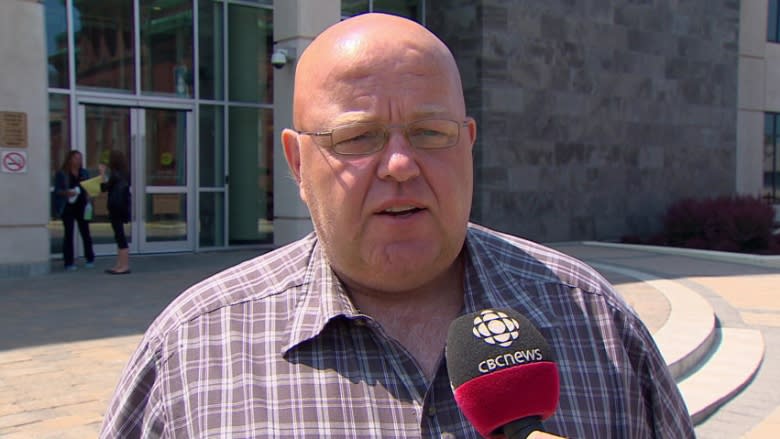Paramedic association investigates alleged mistreatment of Rowley man after 911 call
The Paramedic Association of New Brunswick is investigating after the death of Greg Garnett, whose wife alleges he was mistreated after she called 911 when Garnett suffered severe chest pains.
Greg died in hospital five weeks after suffering an aortic dissection at his home in Rowley, outside Saint John toward St. Martins.
His death came after what his wife Cathy Garnett described as a series of missteps and incorrect assessments by paramedics at Ambulance New Brunswick and staff in the emergency department at Saint John Regional Hospital.
"We're well aware of it and we have undertaken an investigation into the alleged allegations that we've become aware of through the media and other sources," said Chris Hood, executive director of the Paramedic Association of New Brunswick.
- 'He wasn't ready to go': Callous medical care of man crying in pain haunts family
- N.B. watchdog calls for independent review of Rowley man's death
- Health minister won't apologize for Rowley man's treatment until he hears all sides
Depending on the amount of information needed for the investigation, Hood said it could last from 30 to 90 days.
"From the licensing body perspective, any time they hear incidences of any significant seriousness, they're obligated to investigate to determine whether the incident is serious enough to move onto a disciplinary hearing," he said.
Cathy Garnett has already filed complaints with the Paramedics Association of New Brunswick and the Nurses Association of New Brunswick over her husband's treatment the morning of April 28, 2017.
She has said paramedics who responded to her 911 insisted Greg's pain related to his back and "nothing serious" and conveyed the same message to hospital staff, although his condition was far more serious and often fatal.
Hood said the paramedic association has the authority to obtain information from a number of employers, including Ambulance New Brunswick, the service run by Medavie Health Services.
"If they have documentation or information that is relevant to the case in written format or verbal format or recorded format, than we have the legislative authority to be able to seek and obtain those kinds of documents."
The information is then reviewed "by a body of peers, which includes two paramedics, who have received training in how to conduct the reviews, and a member of the general public, who is appointed to ensure transparency and accountability in the investigation," Hood said.
Hearing open to public
Depending on what the investigation shows, Hood said, the case could move to a disciplinary or fitness-to-practise hearing.
This is similar to a court proceeding, although there isn't a judge. Legal counsel represent the interests of the complainant and the paramedic.
The hearings are open to the public.
Over a number of years, Hood said, seven or eight paramedics have lost their licences either temporarily or permanently following the hearings.
Health Minister Benoît Bourque has already said his department will do its own investigation into what happened and will be checking with regional health authorities.
Cathy Garnett said her husband was in agony for five hours until a CT scan at the Saint John Regional Hospital revealed the aortic dissection.
The condition occurs when the inner lining of the aorta tears, sending blood flooding between the inner and middle layers of the blood vessel and causing the layers to separate or dissect. Dissections can be fatal, especially if the outer wall of the aorta ruptures.
The 52-year-old Garnett had emergency surgery, but he died five weeks later, in June 2017, from complications.
Kicking 'not taught' to paramedics
Cathy said her husband was kicked and yelled at by the paramedics, told to be quiet by a nurse, had to wait 40 minutes at the hospital before a doctor saw him, and didn't get the CT scan until more than two hours after he reached the ER.
Although Hood wouldn't speak about the particulars of the case, he did say "that kind of portrayal of care is not acceptable."
"That particular action is not taught, it is not used as a method of care in any jurisdiction in this country and certainly not in the province of New Brunswick."
Ombud Charles Murray has said this case points to a loss of compassion and respect in the system.
Hood hopes this isn't the case but he found the ombud's comment concerning and hopes the paramedic association will be able to get answers to lingering questions about the case.
"We see paramedics everyday going to practise in situations that are some of the deepest and darkest of any of the health-care practitioners in the province or the country."
"If we've lost compassion we're … in a significant detrimental situation."
Not the first time
This week, two Hamilton, Ont., paramedics were charged in connection with the Dec. 2, 2017, death of a 19-year-old Good Samaritan. Police said Yosif Al-Hasnaw was shot trying to help an older man who was being accosted by two men outside a mosque.
Witnesses alleged that paramedics took too long to treat and transport Al-Hasnawi to hospital. They also alleged paramedics had accused the man of acting as if his wounds were worse than they were.
Hood suggested that in New Brunswick,similar issues would be dealt with in civil action or quasi-judicial actions.
"Could it happen in New Brunswick?" Hood said of the criminal charges in Ontario. "Absolutely. I guess it could if there was a situation where a paramedic did something in a criminal nature that was against the law."




